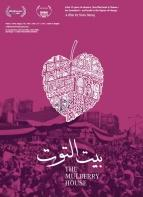Human Rights Watch Film Festival 2014: The Mulberry House

Sara Ishaq returned to Yemen’s capital Sana’a in 2011 partly out of an attempt at reconciliation with her father, while also with the intention to make a film about her grandfather as part of a project for film school. Little did she know that she would witness the start of a revolution in Yemen, that soon after her arrival Sana’a would be swamped with people en masse, protesting in an attempt to overthrow the then Saleh government. The Arab Spring that had blossomed in Tunisia had reached Yemen.
The half-Yemeni, half-Scottish Ishaq spent her childhood in Yemen with her father but then left to live with her mother in Scotland, and recently graduated in film directing from the Edinburgh College of Art. Since graduating things have moved along fairly quickly for her, with The Mulberry House winning several documentary awards.
This documentary obtains all the stark realism and frank, undisguised openness that has become the epitome of new guerilla-style journalism and documentary filmmaking that has taken shape. With Ishaq at times acting as a correspondent, the film also gives an insight into the exchange in information between large international broadcasters to the people on the ground witnessing the events first hand.
The events outside the house captivate those within. Family members help by cooking food for those protesting in the square, and donating blood to those lying injured in the hospital. It would be wrong, however, to see this film as overtly political in outlook. Of course the protests taking place outside the confines of the Ishaq family home are the source of much of the conversation and focus in the film. Yet, it is from within the home that a subtler family politics is enacted. Almost in the manner of a home video, Ishaq with her camera observes her Yemeni family with the poetic acuteness of someone who is at once both an outsider and an insider. Her presence opens up a dialogue and destabilises both her father and grandfather’s assumed patriarchal standing, debating attitudes on dress codes and marriage. A smaller revolution is materialising in the family, and shifts in relations occur before the camera as her father grows to see her in a different light as a grown woman with courage and dedication.
There is a vibrancy and humour to the film in its capturing of the everyday family interactions that counteract the bloody conflict taking place outside of the home. She follows her grandfather, the joker in the family and source of much comic relief, as he focuses on the general upkeep of the house. The house is always full of young children and guests coming and going. Ishaq has assembled a film that manages to balance both humour and pain, and that makes for a very personal and raw exploration on family and politics, and how the two collide.
As Ishaq admits in the Q&A afterwards, most of positive fervour that existed during the time of the revolution has subsided somewhat and has been replaced by a slightly defeatist outlook. Yet she feels that an important conversation has begun. The Mulberry House exists as a metaphor for spring, for change – the mulberry season is when all the berries are picked and the tree is left barren. As Ishaq declares with optimism, Yemen is now waiting for its next mulberry season.
Thoralf Karlsen
Read more reviews from Human Rights Watch Film Festival 2014 here. For further information about the festival visit here.
Watch the trailer for The Mulberry House here:

























Facebook
Twitter
Instagram
YouTube
RSS